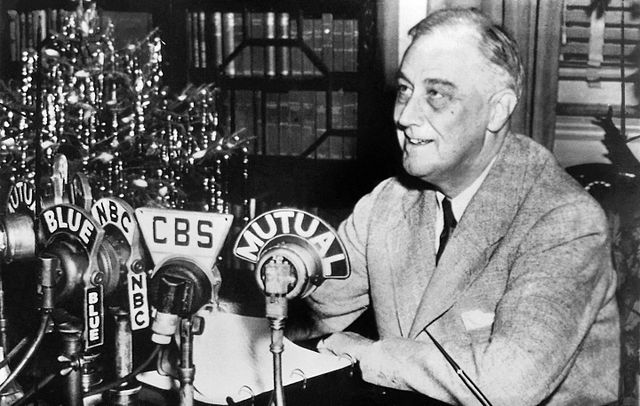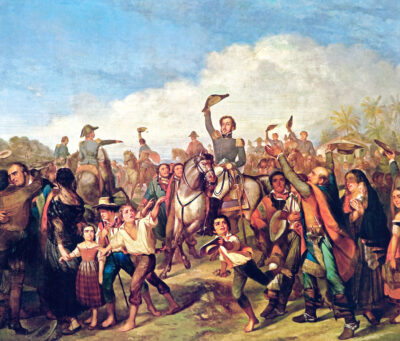The prospect of returning to a prolonged period of successful American leadership in the world remains uncertain—regardless of the fact that America can correctly be considered “back” to playing its historical role. Long-overdue arguments are rightfully being debated within the foreign policy community about how to reframe what an active and engaged U.S. foreign policy requires to be successful.
Two specific strategies represent important conceptions of how America’s traditional role after 1945 can retool itself to address the new global environment: one emphasizes a foreign policy for the middle class and the other frames the world into free versus autocratic societies.
Each strategy rightfully diagnoses the threats to U.S. global leadership and national security—competition with China, transnational challenges (i.e. pandemics, terrorism, climate change, etc.), democratic backsliding, and domestic economic inequalities. Most importantly, both attempt to reconcile an active U.S. foreign policy with an American public increasingly disillusioned by U.S. global engagement. Each offers necessary insights and proposals for America’s leadership role in the 21st century.
However, the problem with these strategies is not their content—it is that they fail to sufficiently account for their ultimate audience.What is missing is how an active and engaged U.S. foreign policy can be presented and articulated to the American public.
A foreign policy strategy that fails to effectively communicate its value to and for the American people, as much as it communicates its efficacy to the international community, will ultimately fail as a long-term strategy.
Sustained U.S. foreign policy has been most successful when it is supported by the American people. This presents problems for foreign policymakers currently advocating an active global leadership role. Unless such strategies incorporate a better way for communicating America’s significance and exceptionalism to the American people in an effective manner, foreign policy visions for U.S. leadership will be overshadowed by more isolationist instincts in the next few decades—and with that, the hopes of winning a strategic competition with China will dwindle.
FOREIGN POLICYMAKERS ARE DOMESTIC POLICYMAKERS
America as a democratic system means that its foreign policy is, to some degree, a reflection of sentiments among the American populace. As such, voter preferences play a significant role in dictating U.S. global posture and engagement.
After the First World War, the majority of Americans opposed an active U.S. role in the world, and American policymakers, consequently, elected not to join the League of Nations. During the Cold War, however, the American people were largely unified about the threat posed by the nuclear-armed Soviet Union. Consequently, the U.S. was able to pursue a successful multi-decade strategy until the USSR collapsed.
American leaders voted into office through national elections in the past have played an outsized role in shaping the nature of the world we exist in today. Likewise, the world we ultimately live in tomorrow will be determined by the leaders we choose now, along with their attendant policies.
Therefore, better understanding the relationship between U.S. foreign policy and national elections, a main measure of how Americans want the U.S. to engage the world, is crucial.
U.S. foreign policy allocates billions of dollars annually, convincing other countries why they should be on board with American interests. But it spends barely a fraction of its time, energy, and resources communicating the same ideas to the American people. It could be argued American foreign policy has done an even poorer job of articulating how American leadership abroad is inextricably tied to economic, political, and cultural prosperity at home.
Poor communication, coupled with the side-effects of globalization and two multi-decade wars in places most Americans have trouble locating on a map, have led many citizens to support a wholesale rejection of the internationalist American project after World War II. It is even more unfortunate to consider how many Americans might simply consider themselves apathetic about U.S. global leadership.
If foreign policy elites fail to communicate effectively to the American public, then the likelihood of electing policymakers disinterested in U.S. global leadership will increase tremendously. And this reality will likely crystallize as the number of citizens without a tangible connection to either world wars continues to accelerate with time. Doing so helps to explain why Joe Biden’s election all but guarantees our country will remain in pursuit of a long-term, engaged U.S. foreign policy.
THE VOICE OF AMERICA, IN AMERICA: A DOMESTIC COMMUNICATION ROLE FOR FOREIGN POLICY
What is needed now is a foreign policy community that exponentially increases its engagement with the American people. When the American Foreign policy establishment claims foreign policy begins at home, they are right. But just as important as it is to have a strong economy, military, and infrastructure, a robust country requires a common understanding of its principles and history. For without which, America will be left to an ordinary role within the disquieted game of power politics.
Given such heightened implications, U.S. foreign policymakers supporting an active global role must be able to communicate what America represents—a country characterized by individual freedoms and underpinned by federal democracy. In order to do so, the foreign policy community must become exponentially more involved in our current national conversations about what America symbolizes in its most fundamental sense.
Within segments across every demographic, the American people appear to be drifting further away from believing in America’s history and its founding principles. Accelerating this is the current domestic efforts to recast U.S. history as a nation with a built-in defect so immense that it renders any attempt to serve as a global example of freedom, equality, and diversity to be fundamentally hypocritical and therefore futile. If not even U.S. citizens believe in America’s historical identity, how can we begin to expect the international community to believe the same?
First and foremost, foreign policymakers must recognize this trend can likely continue. And they must also understand that correcting it is imperative. Short of restructuring national school curricula (which will need to be done to teach accurate U.S. history), one way to address the disconnect might be to develop a domestic public diplomacy campaign aimed at improving communication between insular U.S. foreign policy and the American people—a so-called domestic version of Voice of America (dVOA).
Crucial to this initiative is a reinvigorated commitment to investing in educating the American people writ large on America’s historical role in the world after 1945—on why their long-term security and prosperity has depended, and will continue to depend, on whether the U.S. is able and willing to lead. Personal interest, as much as the national interest, must be clearly articulated.
The composition of this endeavor could take multiple forms. One might imagine an initiative where diplomats spend at least one post within the U.S. working at public schools and universities. In doing so, U.S. foreign representatives will likely develop a deeper understanding of our people. But more importantly, they will have the opportunity to communicate with younger generations about their country’s founding principles regarding the relevancy of accurate U.S. history and connection between U.S. foreign policy and their domestic well-being.
A second element to this dVOA requires the foreign policy community directly engaging in platforms where the national conversation is currently taking place. Political punditry is no longer tenable to appropriately engage the American people in articulating American history and values.
Therefore, the path forward begets the need for foreign policy thought leaders and experts in think tanks, as well as the private sector, to enter communication platforms occupied by younger generations, not only in a social media sense but also in longer-form digital discussions. In every direction, dVOA must open up the possibility for engaging in public debates on the central issues of U.S. history and our principles.
However, it is important to underscore that this endeavor encompasses only a single component within the broader solutions which will be needed to address the growing disconnect with U.S. history and American foundational principles.
Regardless of the initiative’s character, the stakes to reconcile the growing gap between the American public and an active U.S. foreign policy are high. If such reconciliation fails to manifest, crafting the perfect foreign policies for traditional U.S. leadership amid a changing world will fall on deaf ears, domestically and internationally alike.
Elliot Seckler is a graduate student at Johns Hopkins School of Advanced International Studies (‘22), where he is the president of the AHS chapter. He is currently a junior fellow at the National Defense Industrial Association (NDIA)– his interests lie in how DoD fields critical emerging technologies within an increasingly competitive international system.



